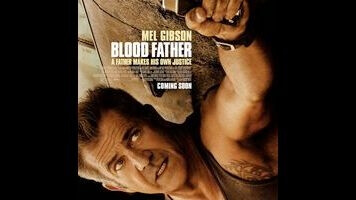Would it be easier for Mel Gibson to make a comeback if every attempt wasn’t some kind of self-reflexive star text? There are Hollywood stars (and respected filmmakers) with worse misdeeds and uglier personal lives, but Gibson, the traditionalist Catholic fixated on torture, is hell-bent on suffering for his sins on screen. Five years after starring as a personally fractured family man in The Beaver, and after an assortment of high-profile projects that fell apart (including one about the Maccabees), he returns in Blood Father, a pulpy father-daughter action-comedy that plays like a mea culpa. Alcoholism, racism, anti-Semitism, men abusing women—just about anything Gibson has ever been documented doing or accused of is there, with the star on hand to acknowledge that it is in fact bad, as though asking for a reduced sentence in the court of public opinion. Having a reformed outlaw biker mutter, “Still backing the losers, I see,” while glancing at the Nazi and Confederate flags hanging in a former friend’s garage is funny, but what does it mean coming from Gibson?
The fact is that Gibson is still a terrifically charismatic presence who inhabits damaged, self-destructive rascals, perhaps because that’s how he wants to be seen. “Every friend I ever had, every skill I ever had is now a parole violation,” says his character, John Link, to an Alcoholics Anonymous meeting at his trailer park in his first scene. Link, initially seen wearing a long salt-and-pepper beard, is a former member of a biker gang who now works as a tattoo artist and lives across a dirt road from his sponsor, Kirby (William H. Macy). He has turned his life around with the intention of making up for lost time with estranged daughter Lydia (Erin Moriarty, utterly unconvincing as a teenager), who calls him collect out of the blue begging for help. She’s on the run from seriously bad people, having shot her abusive boyfriend, a realtor with drug cartel connections. And so, as laws of narrative dictate, Link will have to help her by breaking the law, re-establishing his ties to assorted criminal elements, and generally doing all kinds of things he’s been forbidden to do, all while staying sober.
Adapted from a novel by Peter Craig, who also co-wrote the screenplay, Blood Father trades in the kind of one-liners and asides that have always been its star’s forte (“They must have run out of bullets,” he says after a volley of assault rifle fire abruptly stops), while giving Link a believability and seriousness that doesn’t completely extend to his relationship with his daughter. In other words, it plays to Gibson’s established strengths, with director Jean-François Richet (Mesrine: Killer Instinct, the remake of Assault On Precinct 13) remaining mostly anonymous, apart from a monologue that allows the filmmaker to indulge his penchant for oversimplified radical outlaw rhetoric. Without Gibson’s baggage, it’s easy to appreciate the movie as a minor throwback to the R-rated action films of the ’80s and early ’90s, which similarly mixed the very lurid and the very wholesome, even if the action scenes don’t live up to the genre’s heyday. But isn’t the fact that it’s Mel Gibson showing what’s up to mercenary white supremacists and—in a welcome change from the troubled-hero norm—never straying from sobriety kind of the point?


 Keep scrolling for more great stories from A.V. Club.
Keep scrolling for more great stories from A.V. Club.